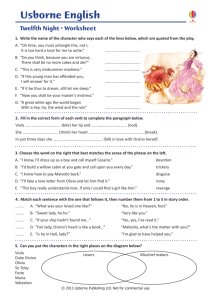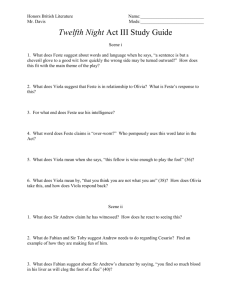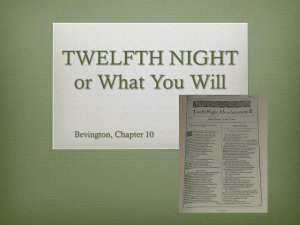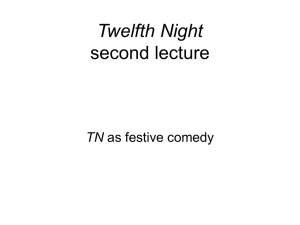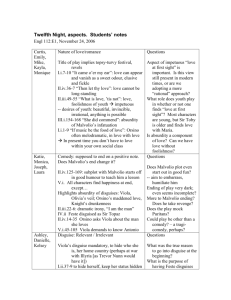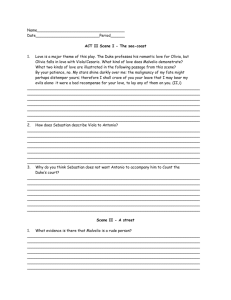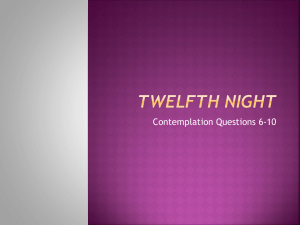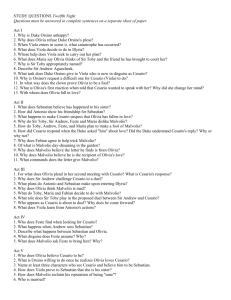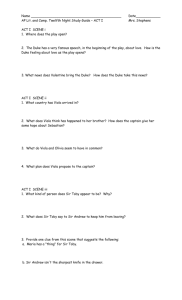Hartwig - Sites@UCI
advertisement
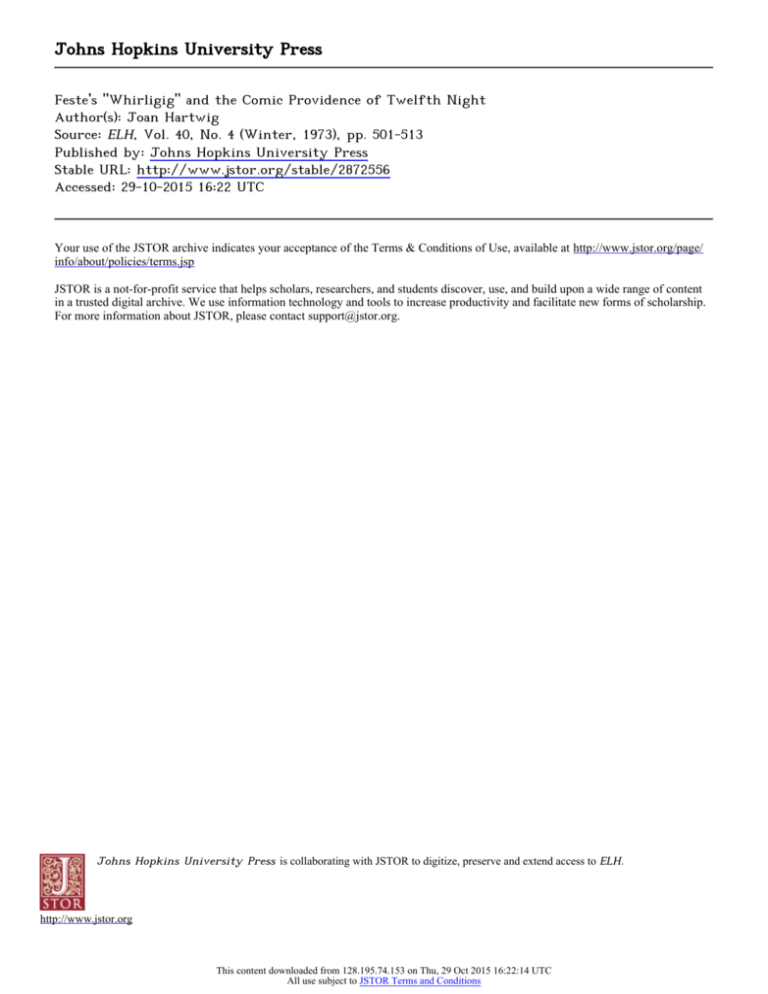
Johns Hopkins University Press Feste's "Whirligig" and the Comic Providence of Twelfth Night Author(s): Joan Hartwig Source: ELH, Vol. 40, No. 4 (Winter, 1973), pp. 501-513 Published by: Johns Hopkins University Press Stable URL: http://www.jstor.org/stable/2872556 Accessed: 29-10-2015 16:22 UTC Your use of the JSTOR archive indicates your acceptance of the Terms & Conditions of Use, available at http://www.jstor.org/page/ info/about/policies/terms.jsp JSTOR is a not-for-profit service that helps scholars, researchers, and students discover, use, and build upon a wide range of content in a trusted digital archive. We use information technology and tools to increase productivity and facilitate new forms of scholarship. For more information about JSTOR, please contact support@jstor.org. Johns Hopkins University Press is collaborating with JSTOR to digitize, preserve and extend access to ELH. http://www.jstor.org This content downloaded from 128.195.74.153 on Thu, 29 Oct 2015 16:22:14 UTC All use subject to JSTOR Terms and Conditions FESTE'S " WHIRLIGIG " AND THE COMIC PROVIDENCE OF TWELFTH NIGHT BY JOAN HARTWIG counterposethe powersof huShakespeare'splays frequently usuallygenerates man and ofsuprahumanwill,and the antithesis a definitionof natures,both human and suprahuman.These vary,however,accordingto the play. For instance, definitions " does not seem the same as the darker, Hamlet's " providence Macbethto pithiswillagainst powerthatencourages equivocating fromDiana and Apolloin a largerorder;and thesecontrolsdiffer the later plays, Periclesand The Winter'sTale. Furthermore, Hamlet's submissionand Macbeth's submissionto non-human controls(ifindeedtheydo submittheirindividualwills) cannot as the same actionor evento implythesame kind be understood ofhumanvision. of TwelfthNightseem to be concerned Many of the conflicts withthe contestbetweenhumanwill and suprahumancontrol; itselfinvariouswaysandis calleddifferent yet,thelattermanifests themselves.'As each contestbetweenthe namesby thecharacters humanwill and anotherdesignerworksitselfout, the involved but not according charactersrecognizethattheirwillis fulfilled, to theirplanning.The individual'swillis finallysecondaryto a accordswithwhat but unpredictably, designthat benevolently, he trulydesires.2For example,whenOlivia,at the end of Act I, imploresFate to accord withher will in allowingher love for Cesarioto flourish, she has no idea thatherwillmustbe circumof Sebastian ventedforherown happiness.Yet the substitution than forCesarioin herlove fulfills herwishesmoreappropriately ' Viola's Captain calls this power "<chance " (I. ii. 6, 8); Viola submits herself to " Time " (I. ii. 60; IL ii. 39); Olivia and Sebastian referto " Fate " (I. v. 296; II. i. 4); Malvolio speaks of Jove's control (II. v. 158, 164; III. iv. 68-77); and the forged letter names " the stars," "the Fates," and "Fortune " (II. v. 131-146). Citations of the plays are from William Shakespeare: The Complete Works, ed. Alfred Harbage (Baltimore, Md.: Penguin Books, 1969). 2 S. Nagarajan, "'What You Will': A Suggestion," Shakespeare Quarterly, 10 (1959), 61-67, employs Thomistic categories to discuss the function of human will in the play. Joan Hartwig This content downloaded from 128.195.74.153 on Thu, 29 Oct 2015 16:22:14 UTC All use subject to JSTOR Terms and Conditions 501 her own designcould have done. Inversely,whenDuke Orsino saysintheopeningscenethathe expectsto replaceOlivia'sbrother in her " debt of love," he doesn'trealizethat literallyhe willbecomeher " brother" (I.i.34-40). As the closingmomentsof the play bringOlivia and the Duke togetheron the stageforthe only time,she says to him, "think me as well a sisteras a wife" (V.i.307); and the Duke respondsin kind: " Madam, I am most and a bit later," Meantime,sweet apt t' embraceyour offer,'" hence" (V.i.310, 373-74). The from sister,/ We will not part Duke had not understoodthe literalforceof his prediction,but his earlystatementof his hope plantsa subtlesuggestionforthe audience. When the play's action accords with Duke Orsino's is a c"will," the discrepancybetweenintentionand fulfillment you "c what that fact the to again points ironywhich delightful " will maybe realized,but underconditionswhichthe humanwill cannotmanipulate.Orsino'sdesireto love and be loved, on the otherhand, is fulfilledby his fancy'strue queen, Viola, more thanhis designforOlivia wouldhave allowed. appropriately in theplay The one characterwhosetruedesiresare notfulfilled is Malvolio. His hope to gain Olivia in marriageresultsin public humiliationat the hands of Feste, who takes obvioussatisfaction in beingable to throwMalvolio's formerhaughtywordsback at foolishhim undertheirnew contextof Malvolio's demonstrated ness: and some Why,'someareborngreat,someachievegreatness, have greatnessthrownupon them.'I was one,sir,in this oneSirTopas,sir;butthat'sall one. 'By theLord, interlude, 'Madam, why am notmad!' But do youremember, I fool, laughyou at sucha barrenrascal? An you smilenot,he's of time bringsin his gagged'? And thus the whirligig revenges.(V.i.360-66) Feste's assertionthat the " whirligigof time" has broughtthis revengeupon Malvolio neglectsthe factthat Maria has been the of the plot to harass Malvolio. instigatorand Feste the enforcer Time's design,insofaras Malvolio is concerned,depends upon froma central significantly Maria's and Feste's will,whichdiffers pointthat the mainplot makes-that humanwill is not the controllerof events. The charactersin the main plot learnfromthe inadeplay's confusingactionthat humandesignsare frequently quate for securing" what you will," and that a designoutside 502 Comic Providenceof " TwelfthNight" This content downloaded from 128.195.74.153 on Thu, 29 Oct 2015 16:22:14 UTC All use subject to JSTOR Terms and Conditions in unexpected ways.Feste'sfallacy, bringsfulfillment theircontrol ofcourse,makestheresultsofthesubplotseemto be thesameas theresultsofthemainplot,but Time'srevengeson Malvolioare measureformeasand thisparticular humanrevenges, primarily justiceallowsno Feste's human control. within ureis thoroughly themarkin humanaction;andtheincipient formissing mitigation by is felt,apparently, crueltythat his precisejusticemanifests in theplay. othercharacters WhenOlivia and her companyhear Malvolio'scase, she respondswithcompassion:" Alas,poorfool,howhave theybaffled abused" (V.i.359,368). thee!. . . He hathbeenmostnotoriously comDuke Orsino,uponhearingMalvolio'sletterof explanation, " (V.i.304). And ments," This savorsnot muchof distraction of evenSir Toby has becomeuneasyabout the harshtreatment scene: " I wouldwe werewellrid Malvolioin theimprisonment I wouldhe delivered, ofthisknavery.If he maybe conveniently withmyniecethatI cannot were;forI am nowso farin offense pursuewithany safetythissportto the upshot" (IV.ii.66-70). Actually,to place the responsesinto this sequencereversesthe play's order;and we shouldconsiderthe factthat Shakespeare withOlivia'sstatement buildstowarda compassionate comment, to the actionsof Feste and an unwillingness condone climaxing Mariain gullingMalvolio-at leastin itslastphase. Feste'sexact revenge, formofjusticewithoutmercyhas alwayscharacterized and eventhe word" revenge"is stressedby severalof thecharactersin the subplot.WhenMaria voicesher apparentlyspontaneousplotto gullMalvolio,she says: The devila Puritanthathe is . . . thebestpersuadedofhimas he thinks,withexcellencies thatit is his self;so crammed, groundsoffaiththat all that look on himlove him;and on thatvicein himwillmyrevengefindnotablecause to work. (II.iii.134-40) of her" revenge" elicitsSir implementation Maria's successful " I could At theendofII.v, he exclaims, Toby'stotaladmiration. marrythiswenchforthisdevice" (168), and whenMaria appears he asks," Wilt thouset thyfooto' my neck?" soonthereafter, ' Notice the similarity between Feste's description of events and Jago's prediction as he encourages Roderigo to join him in his revenge against Othello: " There are many events in the womb of time which will be delivered" (I. iii. 366). Jago implies that he is merely an agent bringing about time's inevitable retributions. Joan Hartwig This content downloaded from 128.195.74.153 on Thu, 29 Oct 2015 16:22:14 UTC All use subject to JSTOR Terms and Conditions b03 (174). The battlefieldimage of the victorand the victimis mockheroic,of course; but in the finalscene Fabian testifiesto its literal fruition:" Maria writ/ The letter,at Sir Toby's great importance, / In recompensewhereofhe hath marriedher " (V.i.352-54). Sir Toby's submissionto Maria's will is a comic parallel for two actions: the pairingoffof lovers,and the submissionof the individual's will to a design other than his own. Yet the inclusion of a parodic version of marriage-harmonyin the subplot does not fullyease the discomfortof the subplot's conclusion. Fabian tries to smooth it away when he suggests that the " sportfulmalice " of gullingMalvolio " may ratherpluck on laughterthan revenge" (V.i.355-58) .4 NeitherFeste nor Malvolio seems to be convinced, however. Feste's " whirligigof time bringsin his revenges," and Malvolio quits the stage with," I'll be revengedon the whole pack of you! " (V.i.366-67). The forgivenessthat should conclude the comic pattern is " notoriously" missing from the subplot and cannot be absorbed successfullyby the Duke's line, " Pursue him and entreat him to a peace." Malvolio seems unlikely to return. The major differences between the subplot and the main plot is clearestat this dramaticmoment: revengeis a human action that destroys; love, graced by the sanction of a higher providence, creates a " golden time." Feste's " whirligig"seems to be a parody of Fortune's wheel in its inevitable turning,particularlywith its suggestionsof giddy swiftnessand change." It provides a perfectimage for the wild but symmetricalcomic conclusion of the play's action. Feste's speech which includes it gives the appearance of completionto a mad cycle of eventsover whichno human had much control. Only in Malvolio's case was human control of events evident. In her forgedletter,Maria caters to Malvolio's " will " and, by encouraging him to accept his own interpretationof circumstancesas his desire dictates,6she leads him not only into foolishness,but also F Fabian's participationin the gullingof Malvolio has a vengefulmotive,because, as he says to Sir Toby, Malvolijo has at some previous time "brought me out o' favorwith my lady about a bear-baitinghere" (If. v. 4-7). 5 The OED cites Feste's line as an example under " circlingcourse, revolution (of time or events)," but other uses of the term cited there are also importantin the forceof the word in Twelfth Night: "whirligig" is the name of various toys which are whirled,twirled,or spun around; the term was also used to signify" an instrument of punishment"; and the word suggests fickleness,inconstancy,giddiness,or flightiness. " of Malvolio's certain response (II. iii. 1376 Maria indicates her " foreknowledge 40), and Malvolio's commentsfulfillher prediction (II. v. 110-12, 150-52). 504 Comic Providenceof " TwelfthNight" This content downloaded from 128.195.74.153 on Thu, 29 Oct 2015 16:22:14 UTC All use subject to JSTOR Terms and Conditions betweenMalvolio's intoa defenseofhis sanity.The discrepancy assumptionthat fortuneis leadinghimon his way and the fact itselfclearlyin the thatMaria is in chargeof his fatemanifests to the revelers(as she leaves the juxtapositionof herdirections stage) withMalvolio'slinesas he enters: MARIA Getyeall threeintotheboxtree... . Observehim, forI knowthisletterwillmake fortheloveofmockery; idiotof him. Close,in the name of a contemplative down jesting.[Theothershide.]Lie thouthere[throws a letter];forherecomesthetroutthatmustbe caught Exit. withtickling. EnterMalvolio. all is fortune.Maria once MALVOLIO 'Tis but fortune; me. (II.v.13-22) toldmeshe[Olivia]didaffect The gullingofMalvoliowhichfollowsis hilariously funny,partly becauseMalvoliobringsit all on himself.Even beforehe findsthe ofrankand hisplans forputtingSir Toby letter,his assumptions in his place elicitvolatileresponsesfromthe box tree. And after he findsthe forgedletter,Malvolio'sself-aggrandizing interpretationsof the oftencrypticstatementsevokehowlsof glee mixed withthealreadydisdainful laughter.The comedyofthissceneis simplein its objectiveexploitationof Malvolio's self-love,and comicbutt. The audience's Malvolio becomesan appropriately thanSir Toby's and the box hilarityis probablymorecontrolled treeaudience'sexcessivelaughter;still,we are unitedin laughing And whenMalvolioappearsin his yelat Malvolio'sfoolishness. low stockingsand cross-garters, the visual comedyencouragesa total releasein the funof the game-Malvolio is gulledand we unneed not feelthe least bit guilty,because he is marvelously Obliviousto anyrealitybut hisown, awareofhisownfoolishness. Malvolio thinkshe is irresistibly appealingwithhis repugnant dressand hiscontinuous smiles-socontrary to hisusualsolemnity -and Olivia concludesthat he has gone mad. "Why, this is verymidsummer madness,"she says,and, then,as she is leaving to receiveCesario,shecommends Malvolioto Maria's care.7 ' Olivia has drawn a similarconclusionabout herselfin the openinglines of this scene: " I am as mad as he, / If sad and merrymadnessequal be " (III. iv. 13-14). Because Olivia concurs with Maria in classifyingMalvolio's peculiar behavior as "4madness," she inadvertently begets the subplottersplan for imprisoningMalvolio. We have Rosalind's word for it in As You Like It that the typical treatmentfor lunaticsin the sixteenthcenturywas imprisonment: JoatnHartwig This content downloaded from 128.195.74.153 on Thu, 29 Oct 2015 16:22:14 UTC All use subject to JSTOR Terms and Conditions 505 Good Maria, let this fellowbe looked to. Where's my cousin Toby? Let some of my people have a special care of him. I would not have him miscarryfor the half of my dowry. (III.iv.55-58) Malvolio miscontrues Olivia's generous concern as amorous passion and he thanks Jove for contriving circumstances so appropriately: I have limed her; but it is Jove's doing, and Jove make me thankful.. . . Nothingthat can be can come between me and the fullprospect of my hopes. Well, Jove, not I, is the doer of this,and he is to be thanked. (III.iv.68-77) Malvolio's scrupulous praise of a higher designer than himselfis a parodic echo of Olivia's earlier submission to Fate after she has begun to love Cesario: " What is decreed must be-and be this so!" (J.v.297). The impulses underlying Malvolio's speech (and to some extent, Olivia's speech as well) exert opposite pulls: Malvolio wants to attribute control of circumstances to Jove at the same time he wants divine identity. He. attempts to simulate foreknowledge through predictive assertion: " Nothing that can be can come between me and the full prospect of my hopes." As long as events are in the hands of a non-human control, man cannot destroy or divert the predetermined order. But Malvolio cannot foresee the vindictive wit of Maria (often pronounced " Moriah "), nor can Olivia foresee the necessary substitution of Sebastian for Viola-Cesario. Each must learn that he, like the characters he wishes to control, is subject to an unpredictable will not his own. Precisely at this moment-when the character is forced to see a discrepancy between what he " wills " and what "is "-the possibility that he is mad confrontshim. Feste seems to adopt the disguise of Sir Topas to convince Malvolio that he is mad,8 and the imprisonment scene evokes a Love is merelya madness,and, I tell you, deservesas well a dark house and a whip as madmen do; and the reason why they are not so punishedand cured is that the lunacy is so ordinarythat the whippersare in love too. (III. ii. 376-80) 8Cf. JulianMarkels, "Shakespeare's Confluenceof Tragedy and Comedy: Twelfth Night and King Lear," in Shakespeare400, ed. James G. McManaway (New York: Holt, Rinehart,and Winston,1964), pp. 85-86,fora similarobservation.Feste makes evident his assumptionthat Malvolio is " possessed" by associatingcarnal sexual interestswith Malvolio's requestthat Sir Topas " go to my lady " (cf. Leslie Hotson, The First Night of TwelfthNight [New York: Macmillan,1954],pp. 108-09). Feste replies: Out, hyperbolicalfiend! How vexest thou this man! Talkest thou nothingbut of ladies? (IV. ii. 25-26) 506 Comic Providence of " TwelfthNight" This content downloaded from 128.195.74.153 on Thu, 29 Oct 2015 16:22:14 UTC All use subject to JSTOR Terms and Conditions different responsethan the letter that exploitsMalvolio by encouraging him to wearyellowstockingsand cross-garters. In theearlierphaseofthegulling,Malvoliois a comicbuttafterthe howfashionofSirAndrewAguecheek, unawareofhisfoolishness; ever,imprisoned, Malvoliois a helplessvictim,fullyaware that he is beingabused. WithOlivia,his extraordinary costumeand perpetualsmilesmakehima visibleclown,and,as a result,he even But withMaria and Feste in theimprisonseemsgood-humored. mentscene,heis notvisible;weonlyhearhimand hisprotestations of abuse. These different visualpresentations producea notable in comiceffectbecause visualcomedyoftenchangesa difference serioustoneinthedialogue.9 thatthings In theimprisonment scene,SirTopas keepsinsisting arenotas Malvolioperceivesthem;but Malvoliorefusesto admit a discrepancy betweenwhat he perceivesand reality. Accordingly,Malvolioinsiststhatheis notmad. Malvoliowithin. MALVOLIO Whocallsthere? CLOWN Sir Topas thecurate,whocomesto visitMalvolio thelunatic.v . . Obsessive interestin sexual lust seems to have been a commonplaceshorthandto indicatemadness for Renaissance dramatists:forexamples,see Ophelia's mad songs in Hamlet (JV.v); Edgar's speech to King Lear as poor Tom o' Bedlam (JII.iv.); and the masque of madmenin The Duchess of Malfi (IV. ii.). Feste is also following Vice's typical role of teasing and tormentingthe Devil when he berates Malvolio. who (Feste asserts) is possessedby the fiend-a point that Feste's song at the end of IV. ii reiterates. ' The two productionsof TwelfthNight that I have seen both chose to emphasize visual comedy. One was the Royal ShakespeareCompany'sperformance at StratfordUpon-Avonin August 1971. During the scene, Malvolio kept poppinghis head up througha left-front trap door, and Feste respondedwith a swiftstomp of his foot, closingthe trap accordingto his whim. In this case, Malvolio was not allowed to see Feste, but the audience was allowed to see Malvolio. A performance in the fall of 1971, by Florida's Asolo Theater, had Feste roll onstage a wheeled cage with a small barredwindowon the upper left,coveredby a flap. A sign reading"Beware the Lunatic" coveredmost of the visible side of the cage and evoked a large laugh fromthe audience. Throughoutthe scene, Feste was able to lift or lower the flap coveringthe bars,so that Malvolio was exposedto the audienceand to Feste according to Feste's whim. In both of these instances,the visual comedy was heightenedat the expenseof the text and its suggestedvisual effects:Malvolio neithersees anyone nor is seen by anyonein the darknessof his prison. An illustrationof this scene from Nicholas Rowe's edition of 1709 shows Malvolio separated from the others by a center stage partition,which would allow the audience to witness both situations simultaneously.This is closer to stage directionsin the text, but, of course, would not have been probable for Shakespeare'sstagingof the scene. See "Plate 9 (c)," W. Moelwyn Merchant, Shakespeare and the Artist (London: Oxford University Press, 1959), betweenpp. 48, 49. Joan Hartwig This content downloaded from 128.195.74.153 on Thu, 29 Oct 2015 16:22:14 UTC All use subject to JSTOR Terms and Conditions 507 Sir Topas, never was man thus wronged.Good MALVOLIO Sir Topas, do not think I am mad. They have laid me here in hideous darkness. CLOWN Fie, thou dishonestSatan. I call thee by the most modest terms,forI am one of those gentle ones that will use the devil himself with courtesy. Say'st thou that house is dark? As hell,Sir Topas. MALVOLIO CLOWN Why, it hath bay windows transparentas barricadoes, and the clerestoriestoward the south north are as lustrous as ebony; and yet complainest thou of obstruction? I am not mad, Sir Topas. I say to you this MALVOLIO house is dark. CLOWN Madman, thou errest. I say there is no darkness but ignorance,in which thou art more puzzled than the Egyptians in theirfog. I say this house is as dark as ignorance, MALVOLIO though ignorance were as dark as hell; and I say there was never man thus abused. I am no more mad than you are. (IV.ii.20-48) In the darkness of his prison, Malvolio literally is unable to see, and Feste makes the most of the symbolic implications of Malvolio's blindness. The audience perceives with Feste that the house is not dark (that hypothetical Globe audience would have been able to see the literal daylight in the playhouse), yet the audience also knows that Malvolio is being " abused" because he cannot see the light. The audience is thereforeled to a double awareness of values in this scene: we are able to absorb the emblematic significance of Malvolio's separation from good-humored sanity and to know at the same time that Malvolio is not mad in the literal way that Peste, Maria, and Sir Toby insist. Although the literal action engenders the emblematic awareness, the literal action does not necessarily support the emblematic meaning. This pull in two opposite directions occurs simultaneously and places the audience in a slightly uncomfortable position. We prefer to move in one direction or in the other. Yet it seems that here Shakespeare asks us to forgo the either-or alternatives and to hold contradictory impressions together. Malvolio cannot be dismissed as a simple comic butt when his trial in the dark has such severe implications .'? 10The problem of whetherto sympathizewith or to reject and ridiculeMalvolio 508 Comic Providenceof " TwelfthNight" This content downloaded from 128.195.74.153 on Thu, 29 Oct 2015 16:22:14 UTC All use subject to JSTOR Terms and Conditions The ambiguitiesof his situationare clear to everyoneexcept hissinglepointofview.Because maintains Malvolio,buthe rigidly own narrowed he refusesto allowmorethanhis focus,he is emblebuttfortheharshcomicactionthatblots maticallyan appropriate out hispowerto see as wellas to act. He mustultimately depend uponthefoolto bringhim" ink,paper,and light" so thathe may extricatehimselffromhis prison,a situationwhichwould have seemedto Malvolioearlierin theplay " mad " indeed. Feste thus does forceMalvolio to act againsthis willin submitting to the to his attitudes." Malvolio refool,but Malvolio fails change mains a literalist-Feste'svisual disguiseis forthe audienceso ofhisperformance, thatwe can see as wellas heartheambiguities a pointthatMaria bringsintofocuswhenshe says" Thou mightesthave donethiswithoutthybeardand gown.He seestheenot" (IV.ii.63-64). In theverynextscene,Sebastianpresentsa contrastwhichdeof Malvolio's response lineateseven moreclearlythe narrowness situation.Sebastian,too,confronts to an uncontrollable thepossibilitythathe is mad: his situationin Illyriais anything but under hiscontrol. This is theair;thatis theglorioussun; This pearlshegave me,I do feel'tand see't; Andthough'tiswonderthatenwrapsme thus, Yet 'tisnotmadness... . For thoughmysouldisputeswellwithmysense That thismaybe someerror,butno madness, Yet doththisaccidentand floodoffortune So farexceedall instance,all discourse, That I am readyto distrustmineeyes Andwranglewithmyreasonthatpersuadesme To anyothertrustbutthatI am mad, Or elsethelady'smad. (IV.iii.1-16:myitalics) is an old one. Charles Lamb probablyopened this Pandora's box when he praised Malvolio as what Lamb thoughthe should have been-" brave, honourable,accomplished": from" On Some of the Old Actors,"The London Magazine, 1822, reprinted in Shakespeare's TwelfthNight, ed. Leonard F. Dean and James A. S. McPeek (Boston: Allyn and Bacon, 1965), p. 150. Many argumentshave been advanced against Malvolio's " humanity" as realized in the play. Two of the more interesting are by S. L. Bethell, Shakespeare and the Popular Dramatic Tradition (London: Kings and Staples, 1944), pp. 77-78, and Barbara K. Lewalski, "Thematic Patterns in TwelfthNight," ShakespeareStudies, 1 (1965), 168-81. " Julian Markels, " Shakespeare's Confluenceof Tragedy and Comedy," p. 84, and Barbara Lewalski, " Thematic Patterns in TwelfthNight," discuss the regenerative potentialsof madness. Both discussionsare pertinentto the emblematicvalues presentedin this scene. Joan Hartwig This content downloaded from 128.195.74.153 on Thu, 29 Oct 2015 16:22:14 UTC All use subject to JSTOR Terms and Conditions 509 Sebastian'spile of contrasting conjunctions(" though,""yet," " but") underlines his hesitanceto forma finaljudgment,unlike Malvolio,whosepointofviewneverchangesdespitetheonslaught ofhis sensory ofunmanageable circumstances. The contradictions lead Sebastianto a stateof " wonder"in whichhe is perceptions a able to suspendreasonand delay judgment,and this signifies of perceptionwhichMalvolio cannotattain. Malvolio flexibility of experienceto considerthat is not stirredby the discrepancies appearancesmaynot be reality;but Sebastiancan appreciatethe of a powerbeyondthe evident.Sebastian's undefinable workings " abilityto sensethe wonder'"in a worldwherecause and effect have been severedgives him a staturethat Malvolio cannot betweenthemis due to the sourceof achieve.'2Yet the difference theirmanipulationas well as to their response. Sebastian is manipulated byFate orbyFortune;Malvolio,byMaria and Feste. Human manipulatorsparody suprahumancontroland because theydo, Maria and Feste definebothlevelsofaction. world Feste,Maria,and SirToby are all in a setand predictable of sportinggullery,and the rules for theirgames are known. Feste's " whirligig"associatesTime with a toy (perhapseven of torture)and limitsTime to humanterms withan instrument ofpunishment.On theotherhand,theTime thatViola addresses knotofdisguise.Feste's attribution doesuntieherproblematic of of Time" pointsup the difference revengeto this" whirligig bebecomesa parodicsubstitweenthe two controls.The whirligig tute forthe largerprovidencethat othercharacterstalk about underothertitles: Time, Jove,Fate, Fortune,or Chance. Signifi- is theonlyhumanlydesignedaction cantly,Malvolio'shumiliation its parodyin thatfulfills itselfas planned. The subplotperforms " it disbut in Feste's summary" whirligig manyotherways,13 playsthe doublevisionthatShakespeareanparodytypicallyprovides. The foiblesoftheromanticsin Illyriaare seenin theirreduced termsthroughSir Toby, Maria, and Sir Andrew,but the limitationsof the parodiccharactersalso heightenby contrast theexpansiveand expandingworldoftheplay. Love,notrevenge, is celebrated. But evenFeste'swhirligig takesanotherspinand does not stop " Shakespeare'sTwelfth Cf.HaroldJenkins, Night,"in Shakespeare: The Comedies, ed. KennethMuir (Englewood Cliffs,N. J.: Prentice-Hall,1965), p. 76. 13 L. G. Salingar discusses some of the other parodic functionsof the subplot in "The Design of TwelfthNight," ShakespeareQuarterly,9 (1958), 119-39. 12 510 Comic Providence of "Twelfth Night" This content downloaded from 128.195.74.153 on Thu, 29 Oct 2015 16:22:14 UTC All use subject to JSTOR Terms and Conditions extendsan emat revenge:in theplay'sfinalsongtheplaywright braceto his audience. Feste's songcreatesan ambiguityof perspectivewhichfusestheactualworldwithan idealone: " therain it rainetheveryday " is hardlythe worlddescribedby the play. RomanticIllyriaseemsto have littleto do withsuchrealisticinof continuousrain is in itselfan trusions.Yet, the recognition excess-it doesnotraineveryday in theactualworld,at leastnot in the sameplace.14Thus,the pessimistic excessof the songbalances the optimisticexcessesof the romanceworldof Illyria; neitherexcessaccuratelyreflectsthe actual world. Despite the apparentprogressthe song describesof a man's growingfrom infancyto maturityand to old age, it remainssomething of an enigma.-5The ambiguitiesof the firstfourstanzas build to a contrastofdirectstatements in thefinalstanza. A greatwhileagotheworldbegun, Withhey,ho,thewindandtherain; Butthat'sall one,ourplayis done, Andwe'llstrivetopleaseyoueveryday. The firstlineofthisstanza seemsto implythattheworldhas its own,independent design;16and it also suggeststhatman'sactions musttake theirplace and findmeaningwithinthis largerand olderpattern.The specificmeaningof that largerdesign,however,remainsconcealedwithinthepreviousambiguities ofFeste's song. His philosophicpretensionsto explain that design are comicallyvague and he knowsit. He tossesthemaside to speak directlyto the audience:" But that'sall one,our play is done." This is thesamephraseFeste uses withMalvolioin his summary speechin Act V: " I was one,sir,in thisinterlude, one Sir Topas, 14 JosephH. Summersmakes a similarpoint," The Masks of TwelfthNight," The Universityof Kansas City Review,22 (1955), 31. In contrast,the song becomesan appropriatedescriptionof the play's world in King Lear (III. ii. 64-77). 5 I disagreewithJohnA. Hart's opinionthat Feste's song " is not hard to fathom": "Foolery Shines Everywhere: The Fool's Function in the Romantic Comedies," Starre of Poets, Carnegie Series in English, 10 (Pittsburg: Carnegie Institute of Technology,1966), p. 47. Hart's own reading of the song's "cgeneral meaning" differsin several major points fromother readings. One of the most generallyheld readingsis by John Weiss, Wit, Humour, and Shakespeare (Boston, 1876), p. 204. It is impossibleto list everyvariant,but worthnotingby contrastis Leslie Hotson, The First Night of TwelfthNight, pp. 168-71, who centershis discussionof the song on the sexual innuendoesthat proceed fromreading"thing" as male genitalia. 16 Leslie Hotson,ibid.,p. 171, n. 2, pointsout that this line " recallsthe Elizabethan euphemismforcoition,'To dance The Beginningof the World!"' Withoutdiscounting that allusion,I suggestthat a much more generalpatternof action is implied. Joan Hartwig This content downloaded from 128.195.74.153 on Thu, 29 Oct 2015 16:22:14 UTC All use subject to JSTOR Terms and Conditions 511 sir;but that'sall one." In bothcases,Feste avoidsan explanation. the dramaticillusionis Turningto the audienceand shattering typicalin epilogues,but Feste's inclusionof the audienceintohis of the play as a metaphorforactual experiencehas consciousness here. ThroughoutTwelfthNight,Feste has a specialsignificance In engagedvariouscharactersin dialoguesof self-determination. " for mourn to fool a is that Olivia out one gameofwit,he points yourbrother'ssoul,beingin heaven" (J.v.65-66).By his irrefutable logic,he winsOlivia'sfavorand hertacit agreementthather has been overdone.The Duke also is subjectto Feste's mourning upon the evaluationin two scenes. Followinghis performance, leaves a Feste love, of unrequited of a sad song Duke's request, paradoxicalbenediction: god protectthee,and the tailormake Now themelancholy forthy mindis a very thydoubletof changeabletaffeta, put to sea, that opal. I wouldhave menof suchconstancy and theirintenteverytheirbusinessmightbe everything, where;forthat's it that alwaysmakesa good voyageof nothing.(II.iv.72-77) And later,when the Duke is approachingOlivia's house, Feste encountershimwithone of his typicallyunique and audaciously appliedtruisms: DUKE I knowtheewell. How dostthou,mygoodfellow? CLOWN Truly,sir,thebetterformyfoes,and theworse formyfriends. thebetterforthyfriends. DUKE Justthecontrary: CLOWN No, sir,theworse. DUKE Howcanthatbe? CLOWN Marry,sir,theypraiseme and makean ass of me. Now myfoestellme plainlyI am an ass; so that and ofmyself, in theknowledge by myfoes,sir,I profit to be as I am abused;so that,conclusions by myfriends makeyourtwoaffirmatives, kisses,ifyourfournegatives and thebetterfor whythen,theworseformyfriends, myfoes. (V.i.9-20) The Duke has in fact lacked some knowledgeof himself,and Feste's pointedremarkmakesit clear that he is usinghis role as of others.In theprisonscene foolto pointup the truefoolishness a game of switching confusing Feste provides with Malvolio, identitiesfromthe Clown to Sir Topas. In each situation,Feste perspectiveforseeing providesthe otherpersonwith a different 512 Comic Providenceof " TwelfthNight" This content downloaded from 128.195.74.153 on Thu, 29 Oct 2015 16:22:14 UTC All use subject to JSTOR Terms and Conditions himself.Thus, it is morethanmerelyappropriatethat at the end ofself. oftheplay Feste engagesthe audiencein its owndefinition By askingthem to look at theirparticipationin the dramatic illusion,Feste is requestingthemto recognizetheirown desirefor humanlywilledhappiness.'7 like the comic providencein the play, has The playwright, understood" whatwe will" and has led us to a pleasurablefulfillmentofourdesires,but in wayswhichwe couldnothave foreseen ofthefinalline," And we'll strive or controlled.The substitution " For the rainit raineth to please you everyday," forthe refrain, in repetition everyday,"is a crucialchange. Like theincremental has builta dynamictension refrain thefolkballad,thispessimistic that the play is an actual exwhichis releasedin the recognition periencein the lives of the audience,even thoughit is enactedin who arranges an imaginedworld.The players,and theplaywright them,are engagedin an ongoingeffortto please the audience. The providentialdesign remainsincompletewithinthe play's action and only promisesa " goldentime"; similarly,the playwrightpromisesfurtherdelightfulexperiencesfor his audience. The subplot'saction,on the otherhand, is limitedwithinthe ofrevenge:therevengeofthesubplotcharacterselicits framework Malvolio'scryforrevenge. Malvolio is the only one who refusesto see himselfin a subservientpositionto a largerdesign. And possiblybecause that designis too small,we cannot feelthat his abuse and finalexclusion fromthe happy communityof lovers and friendsallows the golden time to be fulfilledwithinthe play. Feste's manipulation of Malvolio resembles the playwright'smanipulation of his audience's will, but in such a reduced way that we cannot avoid seeing the differencebetween merelyhuman revengeand the larger benevolence that controlsthe play's design. Universityof Kentucky 1 Cf. Joseph Summers," The Masks of TwelfthNight,"'pp. 31-32. Joan Hartwig This content downloaded from 128.195.74.153 on Thu, 29 Oct 2015 16:22:14 UTC All use subject to JSTOR Terms and Conditions 513
